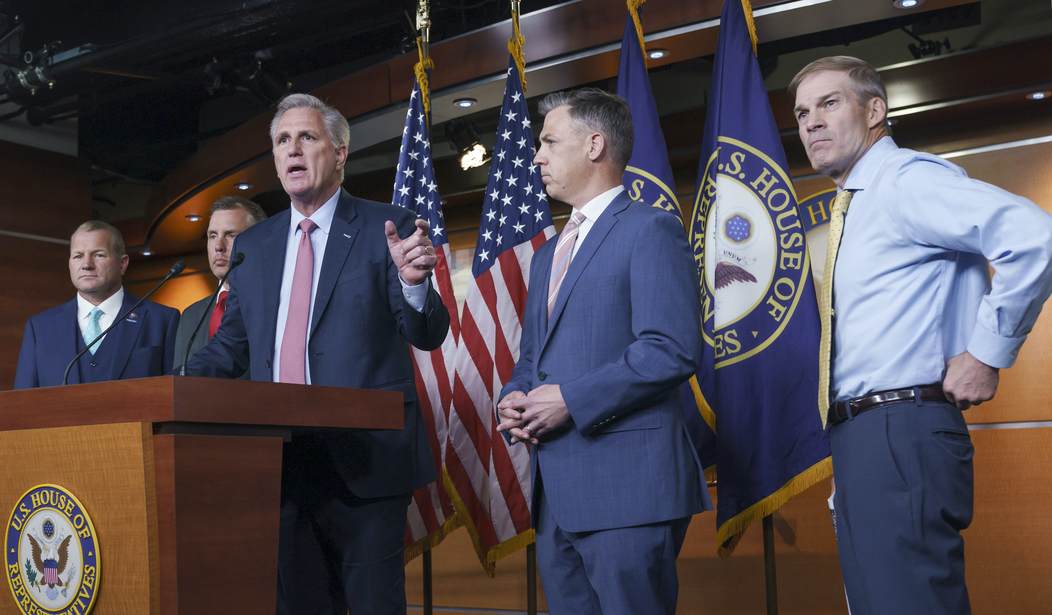To appreciate just how unusual it is for the party to top 47 percent in the RCP average of generic ballot polling, you should take 60 seconds and look at where the GOP stood in previous cycles. In 2020, they topped out at 43.2 percent. In 2018, at 42.4 percent. In 2016, at 45.4 percent. In 2014, a Republican wave year, at 46.6 percent. And in 2012, at 46.0 percent.
You have to go back to 2010, the year of the tea party and the red tsunami, to find Republicans at 47 percent. And in that year, it didn’t happen until August. On February 10, 2010, the party stood at 45.2 percent, three points ahead of the Dems.

That’s rare air for the GOP. A lead as big as four points is rare air too, as they didn’t have that kind of advantage in 2010 until late July.
And if all of that’s not frightening enough for Democrats, note that the 2020 generic ballot polling badly underestimated Republican support on Election Day. The final average that year put the GOP at just 42.5 percent but the party ended up taking 47.7 percent of the vote on November 3, good enough to shrink Nancy Pelosi’s margin in the House and almost flip the chamber. Presumably that was due to the same phenomenon that led pollsters to underestimate Trump’s support — nonresponse bias, in which pollsters fail to detect the true strength of a certain constituency (namely, conservatives) because some meaningful segment of that group simply refuses to respond when pollsters call them.
If nonresponse bias is still at work in today’s data, the true level of GOP support on the generic ballot may be in uncharted territory.
Yesterday Byron York asked a question to which the answer is increasingly clear: “Are Democrats doomed?” He gave five reasons why the answer is yes, but note this one:
3. Joe Biden’s future job approval rating. Yes, Biden is low now, but might his approval rise in coming months, enough to rescue his party in November? That is very, very unlikely. “Looking back more than 70 years, there hasn’t been a single president who substantially improved his job approval rating from late January/early February of a midterm election year to late October/early November,” wrote elections analyst Nathan Gonzales. Instead, Gonzales noted that most presidents’ job approval rating actually fell in the months preceding midterm elections.
Given what Biden’s polling looks like right now, if that trend holds then we really are in uncharted territory this fall. All Democrats can do is hope that the pandemic is the ultimate black swan event and therefore the electoral trend might *not* hold if we manage to avoid any new major COVID surges between now and November.
The generic ballot polling also explains why Mitch McConnell has been willing to antagonize MAGA types lately by slamming the RNC for its censure of Liz Cheney and Adam Kinzinger. McConnell is playing a prevent defense; he doesn’t want to hear, or say, one word that might potentially give swing voters a reason to potentially reconsider their anti-Biden tilt towards the GOP. If that means taking on populists over January 6, he’s willing to do that. Anti-insurrectionists are welcome in my party, he’s been saying — and is even tying that point to the GOP’s “tough on crime” message:
“It was mostly a peaceful protest,” Rep. Michael Cloud, a Texas Republican, said Wednesday in response to McConnell.
“The word ‘insurrection’ is politically charged propaganda,” said Sen. Ted Cruz, a Texas Republican.
McConnell isn’t moved.
“This is pretty simple,” McConnell told CNN on Wednesday. “We are in the middle of a national crime wave. The Republican Party is a pro-police, tough-on-crime party. And I am a pro-police, tough-on-crime Republican across the board.”
Crime is only bad when the other side does it, Mitch. When the right people do it, they deserve pardons.
McConnell also knows that Democrats will try to use the “legitimate political discourse” language about January 6 from the RNC’s censure resolution against the GOP. Dem strategists and officials have confirmed as much to Axios. The RNC has already clarified that that term wasn’t a reference to the riot, only to the rally that preceded it, but forcing Republican candidates to comment on it is an irresistibly obvious way to try to tie them to Trump and his endless “stop the steal” apologetics. If COVID and inflation don’t turn around, that’ll be Democrats’ only play in November — reminding voters that Trump owns the GOP lock, stock, and barrel and that empowering them means empowering him. McConnell’s doing what he can to disprove that.








Join the conversation as a VIP Member